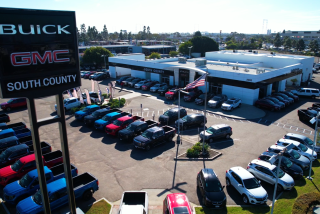Dealers Haggle Over the One-Price, No-Dicker Approach to Auto Sales
- Share via
SAN FRANCISCO — Ever since Saturn Corp. hit the scene early this decade with a no-haggling sales policy, there have been expectations that the confrontational car-buying negotiation process would go the way of the Model T.
Yet horse-trading remains the mainstay of the showroom experience. Today, fewer than 5% of the nation’s 22,400 new-car dealers could be classified as one-price sellers.
But there is some evidence that one-price selling is moving into the fast lane as some major auto makers and publicly traded mega-dealers begin broad one-price selling experiments in their retail networks.
Republic Industries Inc., the nation’s largest auto dealer, has used a no-dicker approach with limited success since entering the used-car business several years ago with its AutoNation superstores.
Now the company is bringing no-haggle, no-hassle selling to the new-car side. It recently installed one-price selling in its 17 John Elway AutoNation dealerships in Denver. Republic, which controls 20% of the Mile High market, plans to institute the one-price plan in other regional markets nationwide.
“People do not like to negotiate,” said Michael Maroone, president of Republic’s auto retail group, during an interview at the recent National Automobile Dealers Assn. annual meeting here. “They are tired of the game. We want to provide a risk-free purchase where everyone gets the same price.”
For years, auto makers have tried to convince dealers to adopt one-price selling, arguing that it improves customer satisfaction and profit margins. But dealers, rightly fearful that competitors will undercut their set prices, are reluctant to adopt no-dicker stickers.
So Ford Motor Co. decided it would show dealers it could be done. In partnership with existing dealers, the auto maker is buying up dealer networks in medium-size markets and instituting one-price selling.
The company--dubbing the new operations Ford Auto Collection--is operating one-price networks in San Diego, Oklahoma City and Tulsa, Okla. It will soon do the same in Salt Lake City and Rochester, N.Y. Ford has earmarked $5 billion to buy dealerships in other markets.
“Over the next five years, a large percentage of dealers will go to no-haggle prices,” said Ross Roberts, president of Ford Investment Enterprise Corp., which oversees the auto maker’s factory-owned stores.
General Motors Corp. is extending the policy pioneered by its Saturn small-car unit by experimenting with no-haggle pricing, particularly in some poor-performing areas where it is trying to consolidate the number of dealer outlets. GM is using one-price selling in 10 franchises in the San Fernando Valley and is planning ventures in Baltimore, Houston and elsewhere.
Mercedes-Benz, the German-based luxury arm of DaimlerChrysler, is moving its entire North American dealer force toward one-price selling. One way it has done this is by shrinking dealer profit margins, thus limiting the ability of dealers to compete among themselves on price.
Other manufacturers that are encouraging dealers to consider one-price selling are Saab, the Swedish maker half-owned by GM, and Land Rover of Britain.
While most dealers acknowledge that no-haggle, no-hassle selling improves the customer experience, they also point out that many shoppers are price-sensitive. They often use a one-price quote as a starting point for negotiations with a nearby dealer.
“If an entire market for a franchise goes one-price, the system is much more likely to work,” said Chris Denove, consulting director for J.D. Power & Associates in Agoura Hills. “It fails if one dealer opts out.”
A case in point is Ford’s experience in Tulsa. Its one-price dealers have lost market share in recent months as other dealers, including some suburban Ford operators, have undercut the take-it-or-leave-it prices. Ford, however, believes in the long run that the one-price operations will win over buyers.
Some consultants say the no-haggle movement is misguided because most consumers still like negotiating. Others point out that one-price in most cases means higher prices across the board.
A recent survey by Dohring Co., a Glendale auto-retail consulting firm, found that 62% of consumers enjoy negotiating a car purchase. Only 35% of consumers favor a system that offers the same price among all dealers.
Still, consolidation and the emergence of the Internet may push more dealers to one-price selling. Cyberspace is equipping more and more consumers with vital information, such as dealer invoice prices, that takes the guesswork out of negotiating. This is likely to force dealers to focus less on price and more on providing more comprehensive and faster service.
“There is no question that the Internet is going to drive one-price selling,” said Maroone of Republic.
*
Fewer but Bigger: The total number of franchised new-car dealers continues to shrink slowly but surely. The National Automobile Dealers Assn. reports there are now 22,400 new-car dealers nationwide, down just 200 from a year ago. But since 1990, the number has declined 9.8%.
More indicative of the industry’s consolidation is the growing dominance of the larger chains, such as Republic, Lithia Motors and Group 1, that are gobbling up smaller, private dealerships.
The industry remains fragmented, but for the first time ever, the nation’s 100 largest dealer groups accounted for more than 10% of new-car sales, as well as 12% of total dealer revenue.
*
Big Appetite: In a little more than two years, Republic has acquired 260 dealer groups with 380 franchises. It has no plans to slow down.
Republic’s plan is to be the dominant auto seller in the nation’s top 50 markets. To date it has a presence in just 28 cities and what it considers critical mass in just 10.
One of its key markets is Los Angeles, where it now has 30 dealerships and four used-car superstores, with a fifth to open later this year. More new-car franchise acquisitions are likely in Southern California this year.
Nationwide, Republic is likely to add more than 100 new franchises to its collection this year.
*
Internet Speed: The key to selling cars over the Internet is speed. Users of the World Wide Web expect dealers to respond to their inquiries, particularly price quotes, within hours.
Auto consultants say dealers are much more likely to sell a vehicle to an Internet shopper if they respond within four hours. If a dealer does not respond within 24 to 48 hours, he has lost a potential customer.
*
Motor City reports news and trends from the industry. Donald W. Nauss, The Times’ Detroit bureau chief, can be reached via e-mail at don.nauss@latimes.com.
More to Read
Inside the business of entertainment
The Wide Shot brings you news, analysis and insights on everything from streaming wars to production — and what it all means for the future.
You may occasionally receive promotional content from the Los Angeles Times.









